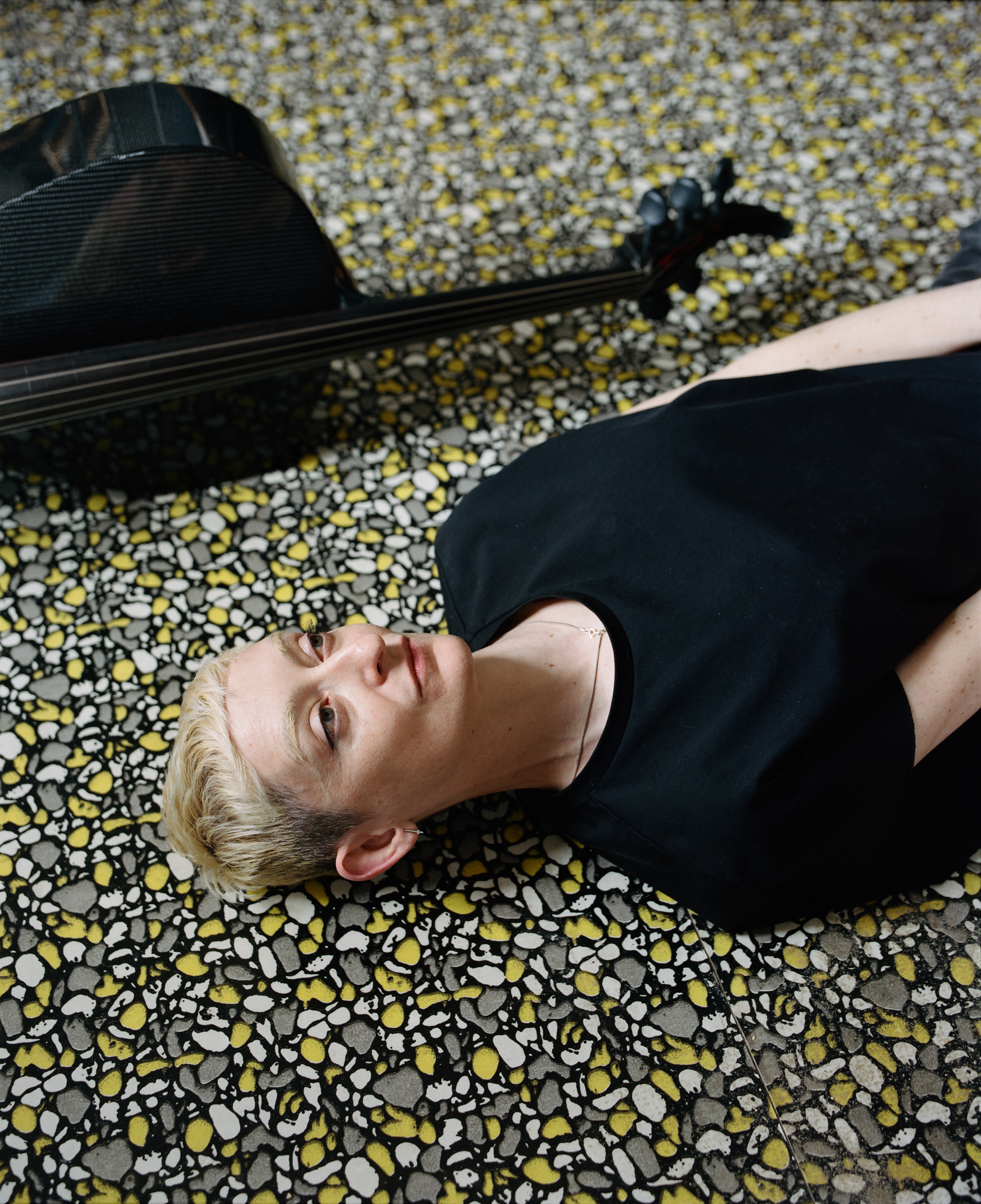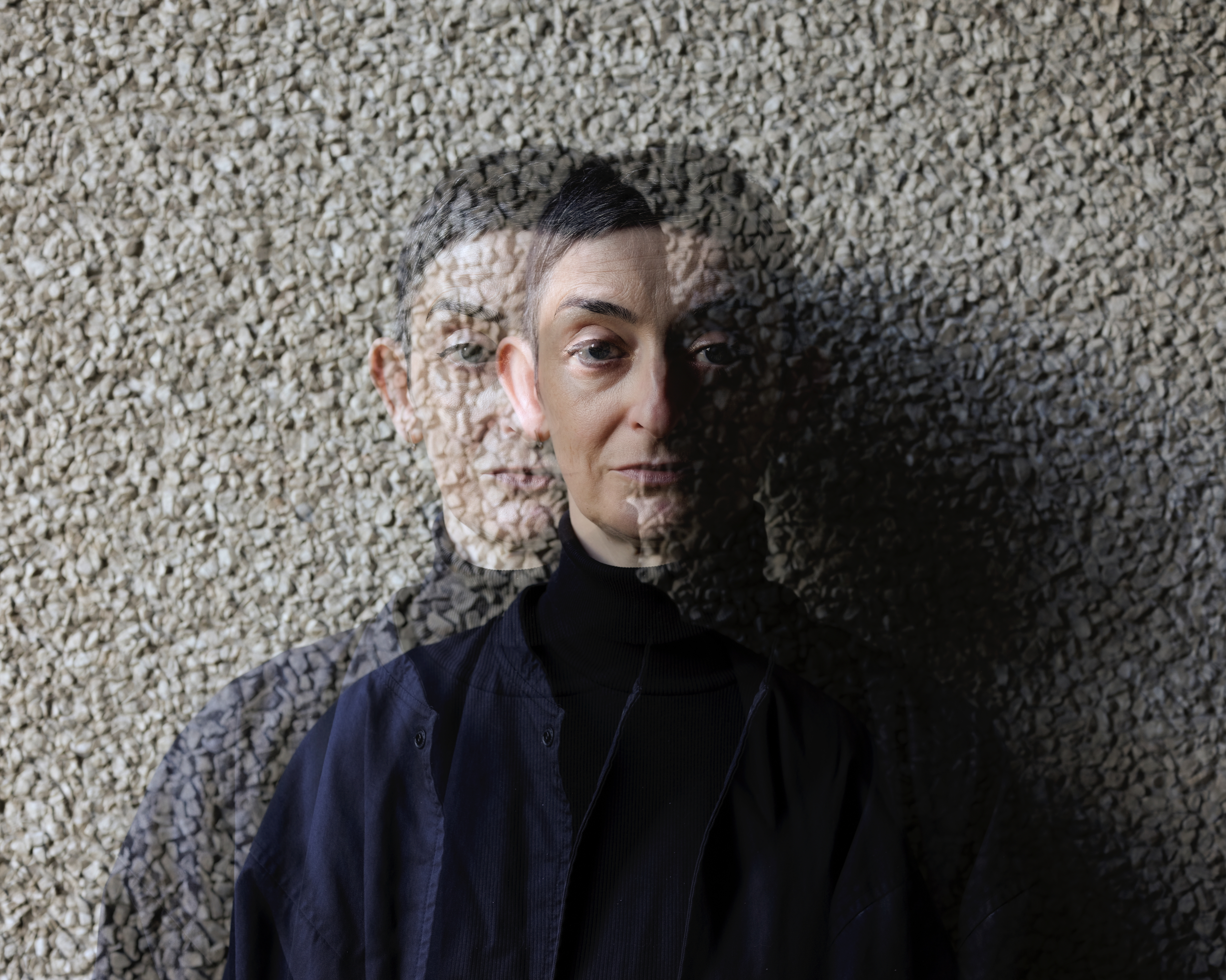 A few weeks ago, Berlin based cellist and composer Martina Bertoni released what is now her third solo album. “Hypnagogia” (Karlrecords), which again focuses on her mostly electronically treated and therefore not always immediately recognizable instrument, is an exploratory journey, inspired in part by Stanislav Lem’s novel Solaris, into the border regions between the waking state and sleep, a phase in which the person falling asleep can experience vatious sensual hallucinations. The mystery that entering into another state of consciousness inevitably means is traced on the album in six exciting, often melancholy colored soundscapes, which in their style and atmosphere tie in with the predecessor “Music for Empty Flats”, in which entering new places was also a major motif. Before her solo career, Bertoni, who’s way lead her from northern Italy via Rome and Reykjavik to Berlin, worked for film soundtracks and in various ensembles. Her work with Teho Teardo, which also included two albums with Blixa Bargeld, was well known in this country. The following interview deals with many of these topics and more.
A few weeks ago, Berlin based cellist and composer Martina Bertoni released what is now her third solo album. “Hypnagogia” (Karlrecords), which again focuses on her mostly electronically treated and therefore not always immediately recognizable instrument, is an exploratory journey, inspired in part by Stanislav Lem’s novel Solaris, into the border regions between the waking state and sleep, a phase in which the person falling asleep can experience vatious sensual hallucinations. The mystery that entering into another state of consciousness inevitably means is traced on the album in six exciting, often melancholy colored soundscapes, which in their style and atmosphere tie in with the predecessor “Music for Empty Flats”, in which entering new places was also a major motif. Before her solo career, Bertoni, who’s way lead her from northern Italy via Rome and Reykjavik to Berlin, worked for film soundtracks and in various ensembles. Her work with Teho Teardo, which also included two albums with Blixa Bargeld, was well known in this country. The following interview deals with many of these topics and more.
In almost every interview you are asked about your beginnings with the cello during your childhood, I think you were six years old and it must have been love at first tone. Do you still remember the first associations you had especially with the sound of this instrument?
It’s kinda weird to describe those moments since I have to fish in my early childhood experiences, but I always had this physical feeling of resonance when listening and while playing the cello.
Do you come from a music-loving family? What are your earliest musical memories?
My mother has always been a good music listener, she used to play a lot of classical music in the house since I was a baby: my earliest memories are of Mozart, Stravinsky and Vivaldi.
For the first circa three or fours years of my life, we lived in a small flat in Milan and I vividly remember that one of our neighbours was working for a record company in the city. This man always gave us tons of vinyls of any kind. I grew up surrounded by them.
My grandfather loved opera as well. I have these memories of him, smoking a tobacco pipe while playing classical music on his tape deck and singing along with it.
Were you interested in classical and popular music at the same time as a teenager?
My years at Conservatorium were marked by an enforced competitiveness, for which I suffered a lot. My teacher did not like me and I reciprocated.
My teenage year are the early 90’s…what was happening in underground music was way too interesting and so much more attractive then sitting in a cello class being told I wasn’t good enough.
So I started playing and fiddling around with rock-and-whatever bands in high school.
I remember being threatened with expulsion from the music school at least a couple of time ‘cause I’ve being caught playing at gigs without official authorisation.
On top of that I wanted to be a little cool with my friends, nevertheless I always felt a bit of a weirdo.
Before you released your first solo recordings about seven years ago, you played in ensembles for several years. Was it a great change for you to suddenly work as a solo artist? What were the biggest (and most rewarding) challenges?
I wouldn’t call it a challenge, playing with and for other people has always been an interesting discovery and learning process. For the very first time I played alone I could confront only myself, so I had to put aside all the practices and the habits I had used and learned until then and seek out my own musical trajectory.
What is always the most rewarding challenge is actually to witness an idea taking shape progressively, and becoming a finished piece.
I feel that solo work often has as strong a connection to others and to interaction as collaborations, just in a different way. How do you see that?
When collaborating there’s a great degree of exchange, verbal and non-verbal, material and non-material, for a purpose that is shared. When working alone, the exchange with other people is always present but has a different nuance and priorities.
This development took place during the time when you also moved from Rome to Berlin. Was the new environment and the large music community of the city also a factor?
Migration was a choice that brought about a lot of challenges, some nice ones and some hard ones, but now I am extremely happy to be here.
I chose Berlin because I have always been curious about it. For the very first period I was less interested into making music. I needed a job and I needed time to process the changes that were happening in my life at that time.
Nevertheless moving here was a breath of fresh air, and realising I was surrounded by such large and variegated artistic scene certainly triggered some good switches.
Has the pandemic changed your way of working and your attitude towards it in any way?
I discovered myself enjoying staying out of the buzz, and just confirmed that I am a bit of a reclusive person.
How did you teach yourself to work with electronics, what were your first steps?
I tried to learn by observing others doing it, listening to a bunch of music and reading as much as I could.
Then it was trying to find my own way into those tools that could fit my environment.
Did you also use electronically generated sounds on your recent albums, or is it only (mostly processed) cello? What is the playful attraction of processing and alienating sounds for you?
In Hypnagogia I used a monophonic synthesiser and a granular one here and there. To break it down I would say it’s 10% Synths, 10% of my voice, 1% field recordings, the rest is processed cello.
For me processing cello is the way I make electronic music, cello is the instrument that has no secrets for me. To constantly find a way to treat it, it’s a rewarding discovery process for me.
I assume that you improvise a lot with regard to the structure and the “plot” of your pieces, and that many ideas develop gradually. Do you nevertheless have something like an idea about the atmosphere of the music beforehand?
I am not an improviser, I usually don’t improvise when I am sketching music. I normally start from a defined musical idea that is already playing in my mind and subsequently working around the best possible ways to play it out. How long does it take to fully develop a piece depends how much pressure I apply to myself. I want to listen to what I record as many times as possible. I tend to be relatively quick though.
“Hypnagogia” is strongly inspired by certain depictions in Stanislaw Lem’s novel Solaris. What exactly appealed to you so much?
I had already recorded a big chunk of the tracks for Hypnagogia when I went back to read again Solaris. Reading the book just clicked with the music I was writing. I felt there was a connection with what the characters in the book were experiencing, their altered state -in and out of conscience – and the eerie and powerful presence of a planet. A sort of catastrophic melancholia that really resonates with me and the music I had written.
Your two more recent albums “Music for Empty Flats” and “Hypnagogia” refer to very different places and states of consciousness (some concrete places experienced in all their nakedness while awake and a place that cannot be precisely determined while dreaming). Did these differences have an effect on the way you worked and on the music?
No, that’s just how the music I make comes out.
Would you say that entering a kind of new territory is one of the commonalities of the two albums, and that associated feelings of curiosity and at the same time uncertainty also shape the music?
I haven’t thought about it, but I am happy you see it this way. I certainly feel very comfortable in not knowing what comes next.
I had the impression that especially in “Hypnagogia” the illusion of materiality plays a (also narrative) role, you think you hear wooden, metallic and aquatic sounds, whereby the first two don’t even have to be illusion. Did you integrate these details consciously?
No I did not. I wanted to depict the moment when you are in a spaceship, coming onto the sun and then realising you cannot control it anymore, or also the vision of a huge meteorite approaching earth.
The nature of the sound in the track “From E to W” reminds me very much of disturbed or interrupted signals in an acoustic transmission. For me, it fits very well with the space travel / Solaris theme and the feeling of being very far away from others and from one’s usual life. Is this feeling also part of the experience of the hypnagogic journey you describe?
That makes me smile, because the field recordings used in that track come from my commuting trips to work on the S-Bahn, from Alex to Zoo. So yes, it’s space and time travel that starts from one’s usual life, the same shared with many others, that can transform into something else.
Your latest album has been classified by many reviewers as ambient, among other things. For me, this designation best fits a music that unfolds its full effect subliminally and that should therefore not be listened to too consciously and concentratedly. Would you say that this is also the case with “Hypnagogia” – and with your music in general?
For many reasons sometimes is necessary to find a genre as a reference. I would put Hypnagogia and my other releases among the Ambient-Drone category, for the sake of reviewers, but we can be very flexible with definitions.
I remember that the first concert I saw of yours was a cello duet with Munsha. Unlike you – you learned to play the cello as a child and have had formal training on the instrument – Munsha is actually a trained singer and picked up the cello relatively late. Do you both speak a very different artistic language, and if so, how does this determine your creative communication?
The beauty is to find common ground while coming from different places, I guess we both share an incredible curiosity for each other’s experiences.
In the interview on Digital in Berlin you said as a first fact about yourself that “change is comforting”. Are you already thinking about future transformations?
Not really, I am comforted by the fact that all is going fine, and I enjoy a lot the ongoing processes.
Fotos © Sybille Fendt
Interview: U.S.
